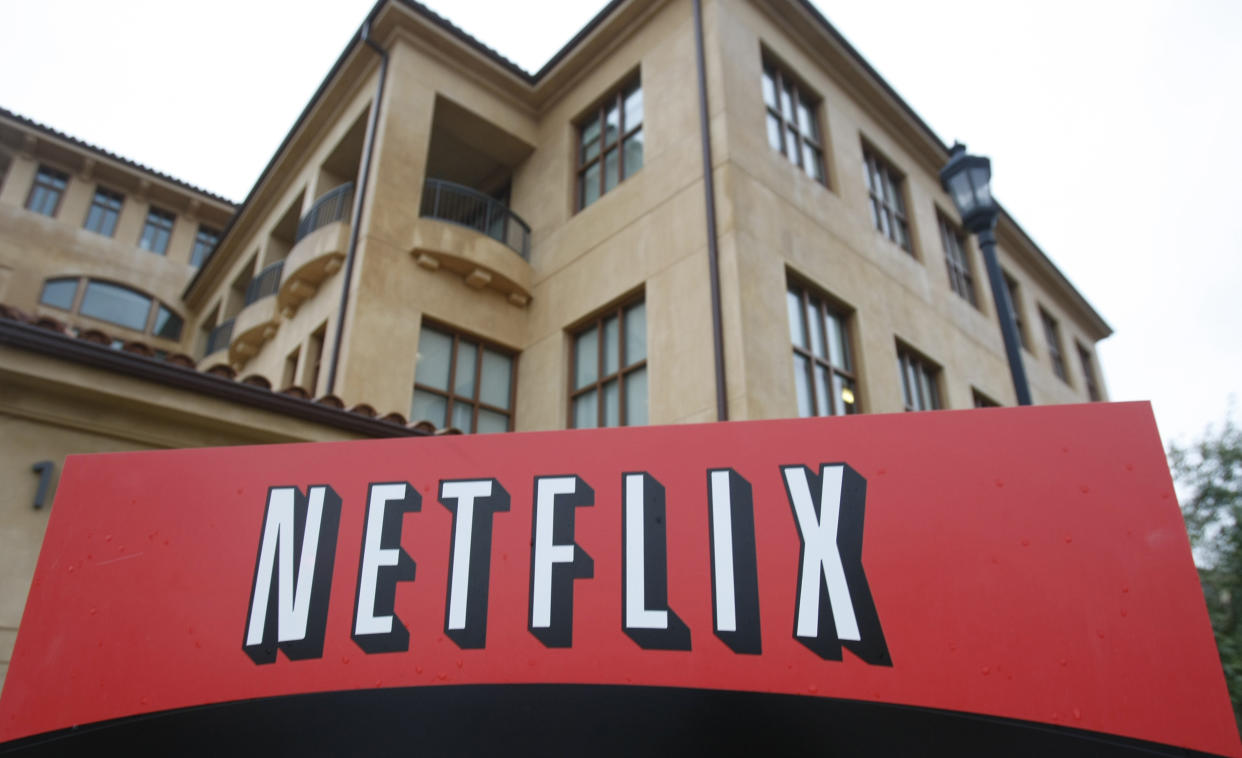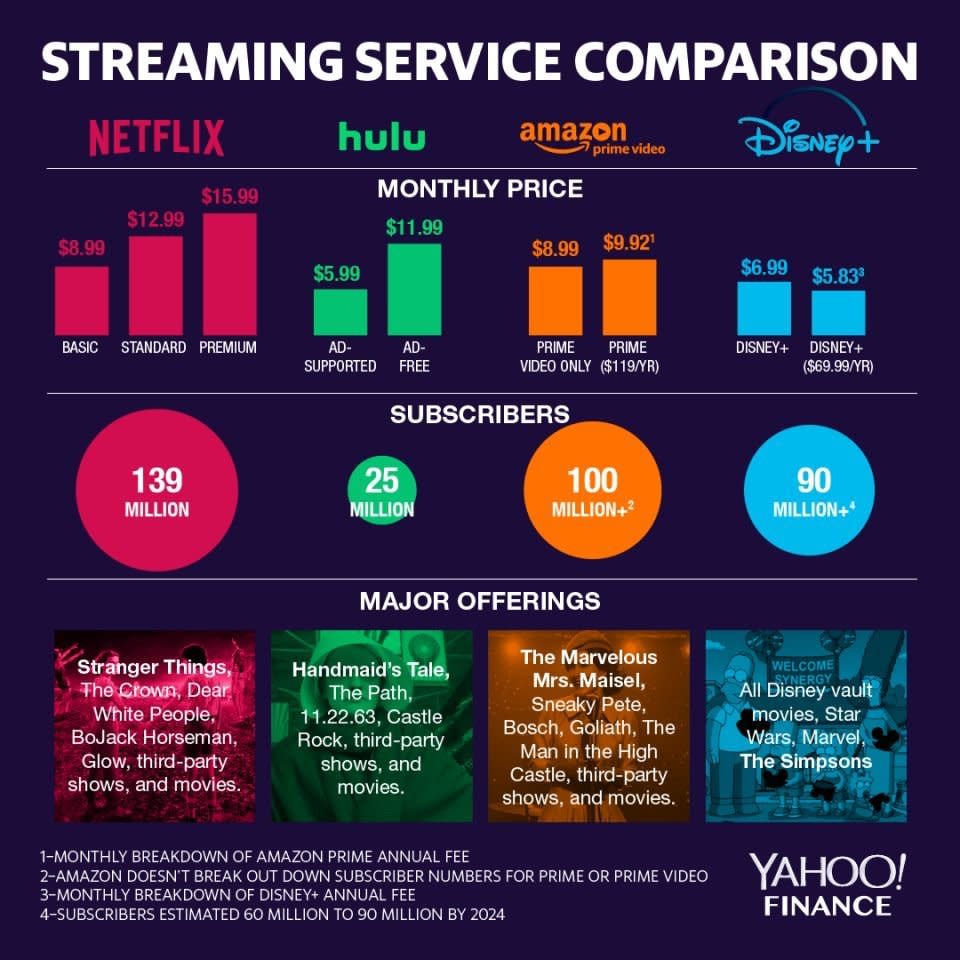Why Netflix doesn’t have to worry about Disney+

Disney’s (DIS) stock jumped over 11% in just 24 hours last week after it unveiled its streaming service. However, one analyst says Disney+ isn’t a “strong alternative” to Netflix (NFLX), which reports first-quarter 2019 earnings on Tuesday afternoon.
For Netflix’s first-quarter 2019, Wall Street analysts are generally expecting the Los Gatos, California-based company to report earnings of $ .57 per share on revenues of $4.5 billion and an addition of 8.9 million new paid subscribers. Netflix’s stock closed at $348.87 per share on Monday — 5% lower than its price last Thursday when Disney announced Disney+.
Despite the stock dip, Netflix doesn’t have to worry about Disney+, two analysts tell Yahoo Finance, because the streaming service is outspending the competition and because it offers a wider selection of films and shows. Netflix may have to worry even less about Apple (AAPL) and its upcoming Apple TV+, which had a disappointing unveiling in late March.
A broader content catalog

“Disney is obviously very family-oriented content, but if you look at Netflix, it’s much much much broader than that,” contended Matthew Thornton, an analyst with SunTrust Robinson, who pointed out Netflix’s original content spans a wider range of genres, including adult drama, comedy, horror and suspense, anime, documentaries and international. “As such, we don’t view Disney+ as a strong alternative to Netflix.”
SunTrust Robinson published a survey in late March showing just 8% of Netflix users are expected to cancel their Netflix subscriptions and subscribe to Disney+ by March 2020. Meanwhile, 24% of Netflix subscribers said they expected to subscribe to both Netflix and Disney+ during the same time period. SunTrust Robinson surveyed 1,032 people in the U.S. in March 2019, 777 of whom were Netflix users.

Much of Netflix’s user retention has to do with how much it’s spending on original content and the kind of content it’s releasing, including Alfonso Cuaron’s “Roma,” which was nominated for an Academy Award for Best Picture and the Sandra Bullock thriller “Bird Box,” which was viewed by over 80 million households, according to Netflix’s letter to shareholders this January.
Big budget

Netflix spent nearly $12 billion on original content last year, according to its fourth-quarter 2018 earnings report — and that figure is expected to grow substantially over the next few years. In a note published this January, BMO Capital Markets analyst Daniel Salmon estimated Netflix’s annual content spending will reach $17.8 billion by 2020.
Those numbers eclipse what the competition spends on original content. Disney, for instance, said last week it planned on spending $1 billion a year on original content for Disney+, with that figure expected to hit “mid-$2 billion” annually by 2024 — the same year Disney estimates its streaming service could become profitable.
Apple, meanwhile, budgeted $1 billion to acquire and develop original content for Apple TV+ during 2018, according to a Wall Street Journal report. And Hulu, which Disney owns a controlling stake in, spent an estimated $2.5 billion overall in programming in 2018, according to MoffettNathanson. (Unlike Netflix, Hulu does not operate outside the U.S.)
Bernie McTernan, vice president at Rosenblatt Securities, told Yahoo Finance he expects Netflix will remain the dominant streaming service in the medium-to-long term. Netflix will be trailed by Disney+, which Disney estimates could reach 60 million to 90 million users by 2014, driven by its competitive $6.99-a-month pricing and well-known properties and brands, including Disney, Pixar, Marvel, Lucasfilm, and National Geographic. For instance, Lucasfilm, which has the Star Wars and Indiana Jones franchises, is already developing “The Mandalorian,” a series exclusive to Disney+ that takes place in the Star Wars universe.
“We think that they [Disney] have content that already has a base they can sell into,” explained McTernan. “That should just be pretty low-hanging fruit for the company to be able to grab on to the service, and those are, our households have already interacted with Star Wars, Marvel and Pixar and Disney animation in the box office. There's already the ‘super fans’ out there that would want that will want the service, and that is what's going to drive [Disney+’s] subscriber growth. Contrast that to what Apple's doing with TV shows like Jennifer Aniston and Reese Witherspoon’s ‘The Morning Show.’ It might be a great show, but there's just not a built-in audience for that.”
That might be somewhat of a relief for investors waiting in the wings for Netflix’s earnings tomorrow.
More from JP:

